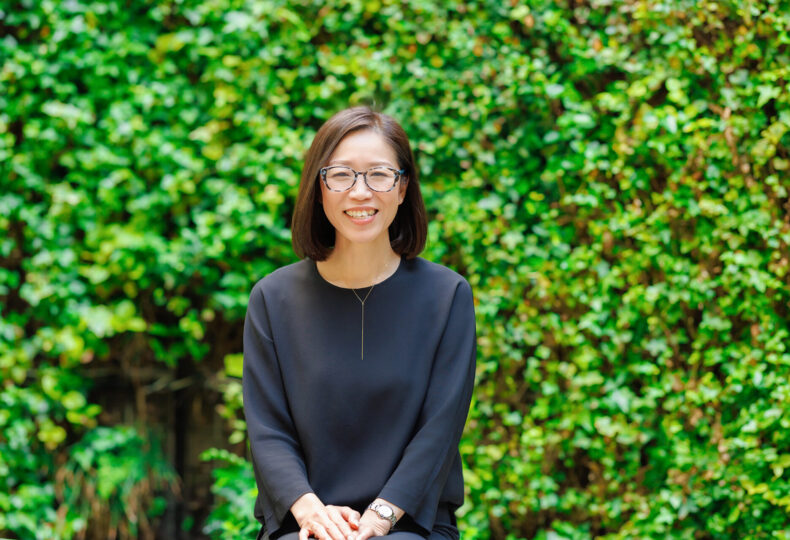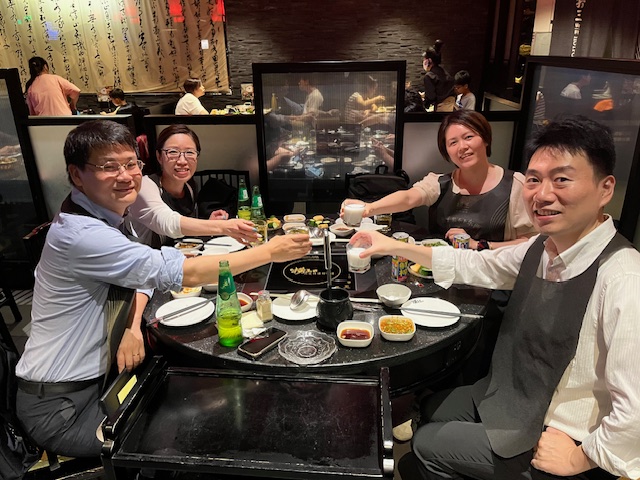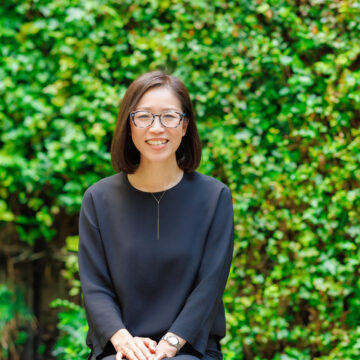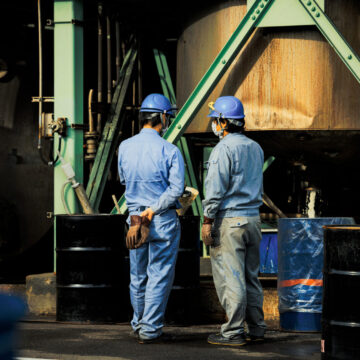
Pushing forward with a “Go for it!” spirit – Aiming globally with trading company business from MANAC Shanghai
In 2022, Miho Yamashita was appointed General Manager of MANAC Shanghai, where she has been building up MANAC’s trading company business, a crucial approach to advance MANAC’s global presence. “The Chinese market has possibilities not found in the Japanese market,” explains Ms. Yamashita, who we sat down with to learn more about MANAC Shanghai’s outlook.
contents
Getting by in Shanghai with a smartphone and the local Japanese community
You embarked on your journey to Shanghai in October 2022. Reportedly, you “don’t speak Chinese,” so how is life in Shanghai going for you?
I started studying Chinese about one week after being appointed. My first steps were learning the “ABCs” of Chinese, or what you might compare to hiragana in Japanese. Still, I really struggle with unfamiliar Chinese characters not used in Japanese and pinyin (a common Romanization system for Chinese). I was pretty worried at first about how I might fare, but once I started actually living in Shanghai, I found that it was surprisingly easy to get by without much trouble even without being able to speak Chinese.
You can pay for everything using your smartphone, so going shopping or taking a taxi is a breeze. Having daily necessities delivered or calling for a taxi is taken care of by simply inputting the destination. So, I was pleasantly surprised with how easy it was to live in Shanghai without being able to speak a word of Chinese.
But you probably can’t get by in business with just a smartphone, right?
All the management materials submitted by consultants are in Chinese, and without any internal specialists for each field, the analysis work is very challenging. I’ve gotten pretty used to it lately, but as you would expect, I do feel that language skills are crucial when it comes to business.
Is it true that alcohol is a fundamental aspect of business in China?
I think cuisine is the centerpiece of the hospitality culture of China. Whether meeting for business or not, whenever you go on a business trip to China, you’ll be welcomed into a place of dining arranged specifically for you. Deepening your friendships and ties with related parties at such events will bring you more business opportunities.
When it comes to baijiu, a Chinese distilled liquor, this brings a grimace to the faces of many newcomers. But it would appear that baijiu is a good match for me since I really don’t mind it at all. Apparently, being a woman laoban (general manager) who can drink baijiu is very unusual, which leaves quite the impression and makes it easy for people to remember my name. I want to be sure and take advantage of anything that works in my favor, like this.
Do you interact with people from other Japanese companies assigned in Shanghai?
Something I greatly value while managing a company in Shanghai is my connection with Japanese corporations. We have get-togethers every now and then, so I am constantly communicating and growing my network of personal connections. Changes in legal compliance requirements change at a dizzying pace in China. For foreign companies, it’s usually the general manager who has to decide what and how changes must be handled. Staying connected with other companies to exchange and share information keeps us ready to handle any sudden changes. I’ve learned first-hand how important it is to form these kinds of connections, not just for those working in Shanghai but anyone assigned abroad.
It has been a year and a half since I was first assigned here, but I have yet to meet another woman assigned as the general manager of a Japanese chemical company in Shanghai. Women general managers are not at all unusual in China, but it seems they are still exceptionally rare in Japanese companies here.
The Chinese approach to management
After 1.5 years so far as General Manager, have you experienced difficulties doing business while navigating differences in customs and culture?
I worked as a “playing manager” in Japan, so I had no actual subordinates. My assignment here is my first time gaining management experience as a section head. And it is incredibly difficult… Each and every day, I am reminded just how different things can be in terms of thinking and approaches when you change locations. In following the saying, “When in Rome, do as the Romans do,” I strive to carry out management that respects and values the assertions and opinions of staff members.
Be that as it may, I may logically understand the importance of such local approaches, but when making business decisions, I inevitably end up going through Japanese thought processes. There are times when differences in opinion come up between me and staff members, but I always do my best to first accept local customs and culture when making decisions.
You mentioned that MANAC Shanghai was established in 2016 and is now a team of four staff members, three of whom are Chinese.
I’ve known the Chinese staff members ever since before being assigned to work in Shanghai since I saw them during business trips. So, I have a lot of confidence in the staff members, and I feel that we have a solid working relationship. But when I became General Manager, things changed for the staff members, and they had to get used to doing things a different way and handling an increased workload. For the first year, I could sense staff members growing perplexed to a certain extent. Two of the three Chinese staff members have been supporting MANAC Shanghai since its founding, so it’s only natural for such change to bring a certain level of confusion.
That’s why I made it a point to hold firm and continue offering thorough explanations over a long period of time until it became understood that “new management and new business environments mean new ways of doing things.” This translated into countless discussions to help each other understand why things were done a certain way up until now, and why we need to change certain things going forward. As we continue communicating this way, I can now see that the staff understands what is needed and handles business accordingly.
As part of the “self-made generation” of Japan, my understanding of management is a product of Japan’s Showa Era, in which you learn from following the examples set by bosses and senior team members. When I came into this position, I had zero management in Japan, and now I am learning what is needed to carry out management duties in China every single day.
While it involves certain challenges, I want to share the many fascinating aspects of the work here unique to MANAC Shanghai. I hope to make MANAC Shanghai a place where future MANAC employees seek to work and take on a new challenge.

The speed of the Chinese market
As you explained, MANAC Shanghai mainly handles MANAC’s flame retardant-related products. You’ve also mentioned that it’s important to continue marketing these major flame retardant products while driving company growth by increasing the share of fine chemical products handled. Can you share more about this?
Investment inevitably involves risk, but failing to proactively seize good opportunities only results in them getting away, leaving you empty-handed. While Japanese companies discuss 99% of the risk involved, Chinese companies will decide to invest with even the slightest potential of a business opportunity. The speed at which decisions are made in China is lightning-fast compared to Japan.
The business style in China also differs largely from that in Japan.
If the Japanese yen weakens against other currencies, we end up needing to raise prices to compensate. In such cases, offering such theoretical explanations is usually sufficient to convince other Japanese companies in China. However, things are a bit different with Chinese companies since it’s very likely that negotiations will break down with those companies saying, “We won’t purchase if you raise prices.” While the price is obviously important, lead time is also another crucial point, so things need to be assessed comprehensively.
In these situations, I make sure to hold my ground whenever I feel the pressure to give in. I zero in on the position of MANAC’s products within the market and strongly emphasize their advantages over other products.
For example, the demand for iodine compounds used in fine chemical products is on the rise. However, since iodine, the raw material, must be secured as a limited natural resource, we can’t easily win customers over through pricing. Instead, we negotiate business focusing on our ability to provide a stable supply and high quality.
Shanghai is one of the largest commercial cities in the world. Therefore, I aim to continue bolstering MANAC’s presence and increasing the value of its products while ensuring we, as a company, can keep pace with the speed of the global market.
Next step: The European market
Since China’s economy has not yet recovered from the pandemic, you mentioned that in addition to marketing MANAC products, you are also looking to expand MANAC’s trading company business globally.
Condominium units in China are furnished with appliances such as washing machines and refrigerators when sold. When China’s real estate bubble burst, new construction declined, and naturally, sales of household appliances also waned. Since about 80% of MANAC Shanghai’s main flame retardant products are used for household appliances, last fiscal year turned out to be a pretty rough one for us.
Since MANAC Shanghai is a trading company, not only do we import Japanese products, we also export Chinese products.
Leveraging our group’s strength, I want to create a business where our Chinese business partners handle the upstream processes while MANAC’s manufacturing handles the downstream processes.
We are also working on our next step, which is to advance our business in Europe. As decoupling trends continue to expand worldwide, Overseas users seem to be increasingly avoiding concentration on Chinese products in terms of BCPs (business contingency plans).
That being said, I don’t foresee any rapid decline in demand for goods from China, which serves as a “world’s kitchen” of sorts. Further, we occupy a niche field with very few competing manufacturers, a position from which we are considering ways to market China’s excellent technological products to the European market and develop larger sales channels.
It is an incredibly challenging undertaking, but I am determined to keep pushing forward with a “Go for it!” spirit.
Looking back at the sense of accomplishment I gained when we worked to establish a new business, I know there’s nothing for me to do but give it a try. I am set on moving forward with establishing a new global business from here at MANAC Shanghai without fearing the possibility of failure.














